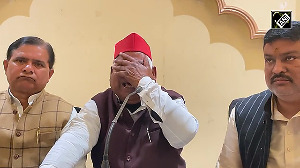International Association of Athletics Federations (IAAF) president Lamine Diack said bans from two years up to life could be imposed from March 1 on managers, coaches or doctors helping athletes to take performance-enhancing drugs.
"We are now well equipped to deal with not only the athletes who cheat but all those surrounding them who are also guilty and must be excluded from our sport," Diack said at the end of a two-day IAAF council meeting in Berlin.
| |||||||||||
The IAAF decided to accept the code of the World Anti-Doping Agency (WADA) as the basis to fight doping but Diack said some exisiting IAAF rules, actually tougher than WADA's, would be maintained.
For instance, athletes will still be suspended immediately after a positive 'A' sample without waiting for the testing of the 'B' sample.
The IAAF accepted WADA's principle that there could be exceptional mitigating circumstances, but only reluctantly.
"For us an athlete is responsible for what is found in his body," said Diack. "We are ready to study possible exceptional circumstances but we know from experience that there are usually none."
MORE CASES
Some member federations had called for harsher suspensions but Diack said the rule would remain a minimum two-year ban for a major offence.
The IAAF reported at the start of its meeting two more positive tests for tetrahydrogestrinone, or THG, and said all the cases so far were related to the BALCO lab in California.
The two athletes competed at this year's world championships in Paris. The IAAF ordered the samples of the two athletes to be tested again after the discovery of THG. No names or nationalities were disclosed.
Five athletes, including European 100 metres champion Dwain Chambers of Britain, had previously failed tests for THG.
The other four have not been officially confirmed but the growing scandal clearly threatens the credibility of athletics, the showcase Olympic sport.
Diack said before the Berlin meeting there was a conspiracy of cheating probably involving organised crime behind the new drug.
The U.S. Anti-Doping Agency (USADA) said BALCO, a firm located south of San Francisco and officially specialised in nutrition supplements which has many top sportsmen and women among its clients, was the likely source of THG.
Several leading track athletes and baseball players, among them triple Olympic sprint champion Marion Jones and her partner Tim Montgomery, the 100 metres world record holder, have already testified before a grand jury investigating BALCO. More will follow.
Hundreds of samples are being tested by International Olympic Committee-accredited laboratories around the world in the search for THG.








 © 2025
© 2025